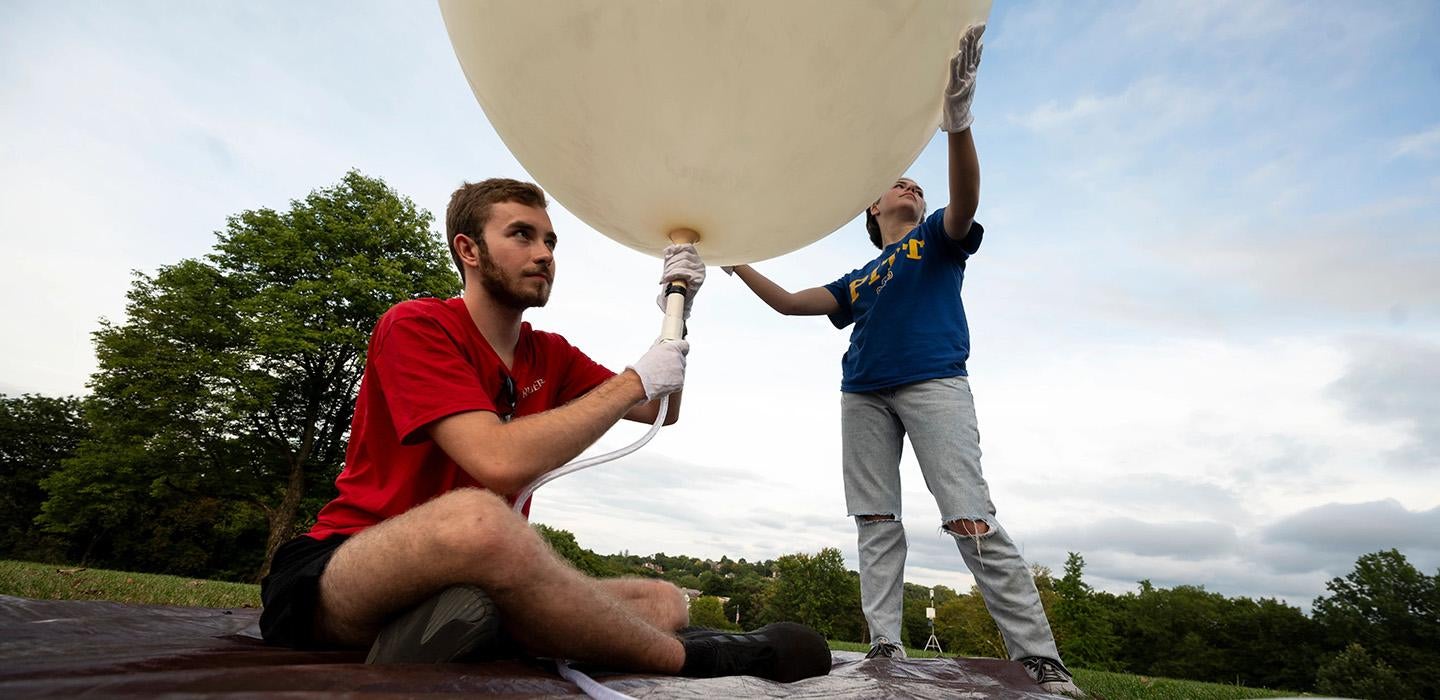
Subscribe to Pittwire Today
Get the most interesting and important stories from the University of Pittsburgh.A group of Pitt researchers are heading to Texas for a unique chance to study an eclipse this week. But on a recent evening at the Allegheny Observatory, they first needed to figure a few things out.
“For one thing, we have to make sure we can launch balloons in the dark,” said Sandhya Rao, a professor of physics and astronomy in the Kenneth P. Dietrich School of Arts and Sciences.
Watch the eclipse like a Shadow Bandit
The student researchers will have two livestreams as they conduct research in Texas. You can watch them launch weather balloons on Sunday, April 7, then see the eclipse and totality on Monday, April 8.
Rao was standing on the observatory grounds on a partially cloudy evening while a half-dozen students busily worked under a nearby tarp. The students were releasing weather balloons, following their trajectories and tracking the data they received from the balloon’s instruments. They asked questions of Rao and David Turnshek, professor of physics and astronomy and director of the observatory, but mostly turned to each other for help.
“It’s definitely a collaborative team,” said Giana Deskevich, a sophomore physics and astronomy student. “We share roles.”
That group makes up half of the Shadow Bandits, a dozen students in the Department of Physics and Astronomy and the Swanson School of Engineering who chase eclipses to answer scientific questions and learn what it’s like to work as a group of scientists in the field.
These next six months are special ones for the team, with eclipses visible in the lower 48 states on Oct. 14 and Apr. 8. Those in a narrow band that sweeps southeast from Oregon will see a “ring of fire,” or annular eclipse, when the moon and sun are in alignment in October. In April, a similar band sweeping southwest from Maine will see the moon completely block the sun, what’s known as “totality.”
Just outside of San Antonio is the one spot where those two bands intersect — where onlookers will be able to see the sun and moon in perfect alignment for both eclipses. So the Shadow Bandits are going to Texas.
In October, the team will collect atmospheric data for NASA as part of the agency’s Nationwide Eclipse Ballooning project. They’ll launch one weather balloon every hour for 31 hours, giving them a clear sense of conditions before, during and after the eclipse.
During April’s eclipse, the Shadow Bandits will head back to Texas to do research of their own on the mysterious, eponymous shadow bands — wavy lines of light that rapidly sweep across the ground — that always accompany total eclipses. One theory is that these “shadow snakes” are caused by turbulence in the atmosphere. If that’s true, then once the team’s altitude balloon rises above the atmosphere, it shouldn’t detect any bands.
The makings of a bandit
Each student on the team has their own origin story for their fascination with eclipses. On the Aug. 21, 2017, solar eclipse, Howard Malc had his back to the whole affair. But he wasn’t ignoring it.
“I was in my driveway, watching through a shoebox pinhole viewer I made,” he said. Malc, a senior with a double major in physics and astronomy and computer engineering, helped build parts of the light sensors that will be carried on a high-altitude balloon in April.
While Malc was studying the eclipse on his driveway, senior physics and astronomy major Ameya Velanker was also outside, taking in the view. But he wasn’t particularly impressed. “From my perspective, it got a little darker, but not that much considering 75% of the sun was covered,” he said. That letdown only built anticipation for what’s coming in April. “In a sense, it has grown my desire to see a total solar eclipse.”
Luke Docherty, a senior in physics and astronomy, vividly remembers watching from an amusement park. “Someone was kind enough to allow me to use their glasses to view the sun,” he said. “It was definitely a memorable moment.”
Students come to the Shadow Bandits with different academic backgrounds, interests and skills — to be successful requires a lot of coordinating and trading places and learning from each other. They’ve picked up skills from soldering to statistics.
“The total solar eclipse is a fitting end to my time at Pitt because this project has defined much of my experience as a physics major” while also allowing him to pick up skills he wouldn’t have learned otherwise, Velanker said.
“Most importantly, there’s something about failing and struggling on a project that bonds us together and makes my teammates some of my best friends in the major.”
— Brandie Jefferson, photography by Tom Altany


